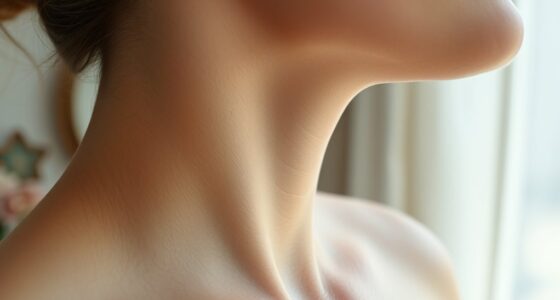Postpartum night sweats are common and usually temporary episodes of heavy sweating during sleep caused by hormonal shifts after childbirth. Your body rapidly adjusts as estrogen and progesterone levels drop, helping you recover and eliminate excess fluids. These sweats can last weeks to months but tend to improve as your hormones stabilize. If you’re concerned or symptoms persist, knowing what’s normal and when to seek help can make a difference—discover more to support your recovery.
Key Takeaways
- Postpartum night sweats are episodes of excessive sweating during sleep following childbirth, helping the body eliminate excess fluids.
- Hormonal fluctuations, especially drops in estrogen and progesterone, primarily cause night sweats postpartum.
- These symptoms typically resolve within weeks to months as hormone levels stabilize, but persistent sweating warrants medical attention.
- Managing sleep environment, hydration, and comfortable clothing can help reduce night sweats and improve rest.
- Severe or prolonged night sweats, accompanied by other symptoms, may indicate underlying health issues needing medical evaluation.
What Are Postpartum Night Sweats?

Postpartum night sweats are sudden, excessive sweating episodes that occur during sleep after giving birth. You might wake up drenched, feeling like you’ve just run a marathon, even if you haven’t been active. These episodes can happen multiple times a night and vary in intensity. Night sweats are often accompanied by a feeling of warmth or heat, making it hard to stay comfortable. They can be confusing or alarming at first, but they’re quite common during the postpartum period. Typically, these sweats happen without warning and may last for several minutes. They’re your body’s way of releasing extra fluids and helping to reset your internal temperature. During this time, incorporating sound healing science techniques such as calming sound frequencies may help promote relaxation and better sleep. While uncomfortable, night sweats are usually temporary and part of your body’s natural adjustment after childbirth.
The Role of Hormonal Changes After Birth

Hormonal fluctuations after childbirth play a significant role in causing night sweats. After delivery, your hormone levels—particularly estrogen and progesterone—drop rapidly. This sudden shift disrupts your body’s temperature regulation, making you more prone to sweating at night. These hormonal changes also affect your autonomic nervous system, which controls sweating and body temperature. As your body adjusts to the new hormonal balance, you might experience episodes of excessive sweating, especially during sleep. This process helps your body rid itself of excess fluid retained during pregnancy. While these fluctuations can be uncomfortable, they are a natural part of postpartum recovery. Understanding that hormonal shifts influence night sweats can help you manage this symptom with patience and proper self-care. Recognizing the role of hormonal balance can further aid in alleviating discomfort during this transitional period.
Common Causes Behind Night Sweats

Night sweats can result from a variety of underlying causes, and understanding these can help you identify what might be triggering your symptoms. Hormonal shifts after childbirth are a common factor, especially fluctuations in estrogen and progesterone levels. Infections or illnesses, such as flu or other infections, can also cause sweating episodes. Anxiety and stress, which are common during postpartum recovery, may trigger night sweats as well. Certain medications, like antidepressants or hormonal treatments, might have sweating as a side effect. Additionally, dehydration or electrolyte imbalances can lead to sweating during the night. Recognizing these causes can guide you in seeking appropriate care or making lifestyle adjustments to manage your symptoms effectively. Maintaining good comfort solutions for sofa beds can also improve overall rest and reduce night sweats caused by sleep disturbances.
Duration and When to Expect Them to Subside

The duration of postpartum night sweats varies widely from person to person, but they typically improve within a few weeks to several months after childbirth. In most cases, you’ll notice a gradual reduction in sweating as your hormone levels stabilize. Factors like breastfeeding, stress, and overall health can influence how long these symptoms last. If you’re experiencing night sweats during this period, remember they’re usually temporary and a normal part of your body adjusting postpartum. Additionally, understanding hormonal fluctuations can help you better grasp why these symptoms occur and how they change over time. However, if your night sweats persist beyond six months, become severe, or are accompanied by other concerning symptoms, it’s a good idea to consult your healthcare provider. Patience is key, and most women find relief as their body continues to recover and rebalance hormonally.
Differentiating Normal Symptoms From Warning Signs

While postpartum night sweats are usually a normal part of recovery, it’s important to recognize when they might signal something more serious. Normal night sweats often occur gradually, last a few weeks, and are accompanied by other postpartum adjustments like hormonal shifts. Warning signs include excessive sweating lasting beyond a few weeks, sudden intensity, or sweating that soaks through clothing and bedding. If you experience chills, fever, or rapid heartbeat alongside sweating, these could indicate infections or other health issues. Additionally, if you notice unexplained weight loss, dizziness, or chest pain, seek medical attention promptly. It’s also helpful to understand that vetted products or remedies may assist in managing discomfort, but persistent or severe symptoms should always be evaluated by a healthcare professional. Trust your instincts—if something feels off or persistent, consult your healthcare provider to rule out underlying conditions and ensure proper recovery.
Lifestyle Strategies to Manage Night Sweats

Implementing simple lifestyle changes can considerably reduce the discomfort of postpartum night sweats. Keep your bedroom cool by lowering the thermostat or using a fan, which helps prevent overheating. Wear lightweight, breathable pajamas made from natural fabrics like cotton to stay comfortable. Stay hydrated throughout the day and avoid caffeine or spicy foods before bed, as these can trigger sweating. Establish a relaxing bedtime routine to reduce stress, such as gentle stretching or deep breathing exercises. Avoid heavy blankets; opt for a light sheet instead. Maintaining a consistent sleep schedule also helps regulate your body’s temperature. Incorporating sound design techniques into your relaxation routine, such as calming ambient sounds, can further promote restful sleep. These small adjustments can make a significant difference, helping you get better rest and easing the symptoms of night sweats during your postpartum recovery.
When to Seek Medical Advice

You should see a healthcare provider if your night sweats persist beyond a few weeks, worsen in intensity, or are accompanied by other concerning symptoms such as fever, chills, or unexplained weight loss. Persistent or severe night sweats could indicate an underlying health issue that requires attention. Additionally, understanding the contrast ratio of your symptoms can help healthcare providers assess the severity and possible causes of your condition.
See a healthcare provider if night sweats persist, worsen, or come with other concerning symptoms.
Consider seeking medical advice if you experience:
- Unexplained weight loss or fatigue
- Fever or chills alongside night sweats
- Signs of infection or other unusual symptoms
Prompt medical evaluation can help identify potential causes like infections, hormonal imbalances, or other health conditions. Early diagnosis ensures you get the appropriate treatment and peace of mind during your postpartum recovery. Don’t ignore persistent symptoms; your health is worth it.
Tips for Better Sleep During Recovery

Getting quality sleep during postpartum recovery can be challenging, especially with night sweats and the demands of caring for a newborn. To improve your sleep, create a calming bedtime routine, such as taking a warm bath or reading. Keep your sleeping environment cool, dark, and quiet to help regulate your body temperature and reduce night sweats. Use breathable, moisture-wicking bedding and wear lightweight pajamas to stay comfortable. Limit caffeine and heavy meals before bed, as they can disrupt sleep. Try to nap when your baby sleeps, even if it’s just for a short while. Establish a consistent sleep schedule as much as possible to help your body adjust. Prioritizing rest and creating a soothing environment will support your recovery and improve sleep quality. Understanding the history of sleep aids used in different cultures can also provide additional strategies for restful nights.
Supporting Your Body Through Postpartum Changes

Postpartum is a time of significant physical changes as your body heals and adjusts after childbirth. To support these changes, prioritize self-care and listen to your body’s needs. Focus on nourishing yourself with balanced meals rich in vitamins and minerals that aid recovery. Staying hydrated helps regulate body temperature and reduce night sweats. Incorporate gentle movement, like walking or stretching, to boost circulation and energy levels.
Here are three ways to support your body:
- Rest whenever you can—your body needs time to recover.
- Use comfortable, breathable clothing to manage night sweats.
- Seek support from healthcare providers for persistent or severe symptoms.
Frequently Asked Questions
Can Postpartum Night Sweats Indicate Underlying Health Issues?
You might wonder if postpartum night sweats signal health problems. Usually, they’re caused by hormonal shifts, sleep deprivation, or your body’s way of adjusting after childbirth. However, if sweats are severe, persistent, or accompanied by other symptoms like fever or weight loss, it’s wise to consult your healthcare provider. They can rule out issues like infections, thyroid problems, or other underlying conditions, ensuring your recovery stays healthy.
Do Medications Affect Postpartum Night Sweat Severity?
Did you know that certain medications can increase the severity of postpartum night sweats? You might notice that hormone therapies, antidepressants, or blood pressure meds trigger more intense sweating episodes. These drugs can influence your body’s temperature regulation or hormone balance, making night sweats worse. If you’re experiencing severe symptoms, consult your healthcare provider—they can adjust your medication or suggest alternatives to help manage your night sweats effectively.
Are There Specific Postpartum Stages With Increased Night Sweating Risk?
You might notice increased night sweating during certain postpartum stages, especially in the first few weeks after delivery. Your body is adjusting hormonally, which can cause these fluctuations. During this time, your estrogen and progesterone levels shift dramatically, leading to sweating episodes. As your body stabilizes over the next few months, the intensity usually lessens. If it persists or worsens, consider talking to your healthcare provider for personalized advice.
How Do Diet and Hydration Influence Night Sweats Postpartum?
Imagine your body as a delicate garden, where your diet and hydration are the nourishing rain. When you eat well and stay hydrated, you help your body’s internal weather stay balanced, reducing the storm of night sweats. Conversely, dehydration or poor nutrition can stir up the clouds, making sweating worse. Keep your garden healthy by drinking plenty of water and eating balanced meals, and you’ll find relief during those restless nights.
Can Postpartum Night Sweats Affect Mental Health?
Postpartum night sweats can impact your mental health by causing discomfort and disrupting your sleep, making you feel exhausted and overwhelmed. As you struggle to rest, you might experience increased stress, mood swings, or feelings of frustration. It’s important to recognize these symptoms and seek support if needed. Taking care of your physical health and finding ways to improve sleep can help you better manage these emotional challenges.
Conclusion
As you navigate postpartum night sweats, remember you’re not alone, and these symptoms are temporary. Embrace the ups and downs, the chills and flushes, the restless nights and peaceful moments. Trust your body’s resilience, listen to its signals, and support it with care. With patience and gentle strategies, you’ll find balance again—restoring your strength, renewing your comfort, and welcoming each new dawn with hope.









